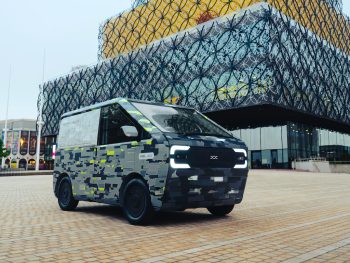UK-based technology company Helixx has revealed the first demonstrator of a new 3D-printed electric van that it says can be built by local businesses virtually anywhere in the world.

Intended to remove “the barrier to zero-emission mobility-as-a-service”, the single-seater van will start production in 2024 using a software-led manufacturing platform, and accompanied by a pickup truck for the construction industry, an open-body ‘tuk-tuk’ auto rickshaw and a closed-body passenger vehicles for ride-hailing fleets.
Thanks to its simple design, the vehicle can be produced in licensed Helixx Mobility Hubs in as little as 180 days from initial site survey to vehicles rolling out onto the street.
The body system uses just five key structural components, all 3D-printed from scratch and then assembled using a ‘click and bond’ process to significantly reduce manufacturing costs – it’s said to simplify the manufacturing process by up to 50% compared to welding stamped body panels and with 30% less mass and hundreds of fewer individual components than traditional vehicles, but still offering “a robust and highly durable” vehicle.
Steve Pegg, Helixx CEO and co-founder, said: “As engineers and designers, we were determined to never lose sight of how and where Helixx vehicles will be produced. We deprogrammed our mindset away from conventional design principles to challenge the complexities of legacy manufacturing systems. We developed this demonstration vehicle to prove and stress-test the global replicability of our digital-first approach.“
Based on a hybrid aluminium chassis, the Helixx commercial delivery van is 3.2m long and 1.5m wide, with a 2,100-litre capacity and a 500kg maximum payload. It features a 110cm rear door width and 140cm load bay length, enabling it to accommodate the majority of global shipping pallets. Its single-seater layout and central driving position optimises load space but while also ensuring compatibility with both left- and right-hand-drive markets.
The Helixx software provides licensees with all information, supply chain, and instructions needed to build their own Helixx vehicles efficiently without “the constraints of legacy vehicle manufacturing”.
Pegg added: “The vehicle visually represents what licensed Helixx Mobility Hubs can produce in as little as 180 days from initial site survey to vehicles rolling out onto the street, offering subscribers access from $0.25 per hour. Our demonstration vehicle will now enable us to amplify our customer engagement and gain valuable feedback from the market.”
The demonstrator vehicle will now face validation and in-market feedback before the company starts a production run of 100 vehicles at its pilot hub in the UK, ahead of customer vehicle and factory rollout starting at a concept hub in Southeast Asia.
The company, which was founded by engineer and vehicle concept designer Steve Pegg and hypercar designers Jowyn Wong and Jakub Jodlowski, is in discussion with customers in the Asia Pacific region, with India, MENA, and South America to follow.

